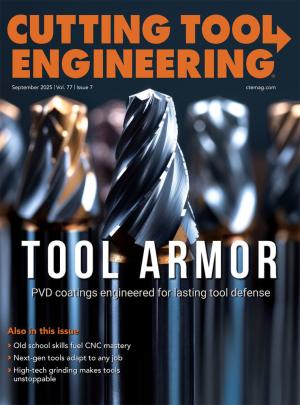Maybe tariffs will drive U.S. manufacturing reshoring, maybe they won't. Based on how the industry has fared so far in 2025, I think meh is a precise one-word assessment. That's why, in August, two separate announcements from Apple and GE Appliances caught my attention. Apple increased its investment in U.S. manufacturing to $600 billion while GE Appliances revealed a $3 billion plan to shift even more of its production to the U.S.
“Our long-term strategy is about manufacturing close to our customers. With lean manufacturing, upskilling our workforce and automation, the math works for manufacturing in the United States,” GE Appliances CEO Kevin Nolan said in an Associated Press report about the company's plans.
Apple CEO Tim Cook, meanwhile, said the Cupertino, California, company will increase its investments across the U.S. to $600 billion over the next four years. Plus, he announced the launch of Apple's American Manufacturing Program (AMP). Through AMP, Apple will work with its suppliers to accelerate U.S. manufacturing. "This includes," said Cook, "new and expanded work with 10 companies across America." The first AMP partners include Corning, Coherent, GlobalWafers America, Applied Materials, Texas Instruments, Samsung, GlobalFoundries, Amkor, MP Materials and Broadcom.
While many U.S. manufacturers are taking a wait-and-see approach to reshoring, the commitments from Apple and GE Appliances stand out as exceptions. These companies are not simply reacting to tariffs — they are making the best of a difficult global trade environment. With deep cash reserves, they can absorb the massive upfront costs of moving production, while reaping long-term benefits in supply chain control, speed to market, and “Made in USA” brand value. Tariffs may have sweetened the math, but it is the volatility of global supply chains over the past five years that has truly underscored the need for strategic, domestically anchored manufacturing.
On that note, I would like to share some pertinent insights culled from the Reshoring Initiative's recent annual report that I think may help you prepare for whatever reshoring may come.
Speed matters: A striking 43% of OEMs are willing to pay 10% to 20% more for components that can arrive just five weeks sooner. For many of you, that means you’re already in the game — Midwest delivery from China by surface freight is six weeks on its own. If you can quote faster turnaround and deliver on it, you’re not just matching imports, you’re beating them with a built-in value premium.
Engineering proximity: OEMs place significant importance on having engineering teams close to manufacturing. This is an opportunity for you to make your engineering team more accessible or perhaps just to make it easier for OEM engineers to interact with your shop.
Reducing risk: OEMs see reshoring as more than just cutting shipping time — they’re looking to reduce risk, improve customer satisfaction and strengthen balance sheets. Shops that can promise reliable delivery, stable pricing and long-term quality will be in a stronger position when OEMs decide who gets the reshored work.
The future includes you: Among the contract manufacturers recently surveyed for the Reshoring Initiative, 70% had under $25 million in annual revenue. That means the reshoring wave isn’t just for the big guys — it’s for you. Expect OEMs to first shift sourcing for components in current domestic assemblies to local suppliers, then bring reshored assemblies back home. Shops that can meet OEM needs for faster delivery, reduced freight costs, geopolitical stability, higher quality and tighter engineering collaboration will benefit.
Reshoring isn’t an abstract policy trend — it’s a pipeline of potential work for small and mid-sized shops. If you can compete on speed, technical accessibility and risk reduction, you’re in a prime position to capture that work as OEMs make the move back home.
Related Glossary Terms
- lead angle
lead angle
Angle between the side-cutting edge and the projected side of the tool shank or holder, which leads the cutting tool into the workpiece.
- lean manufacturing
lean manufacturing
Companywide culture of continuous improvement, waste reduction and minimal inventory as practiced by individuals in every aspect of the business.

